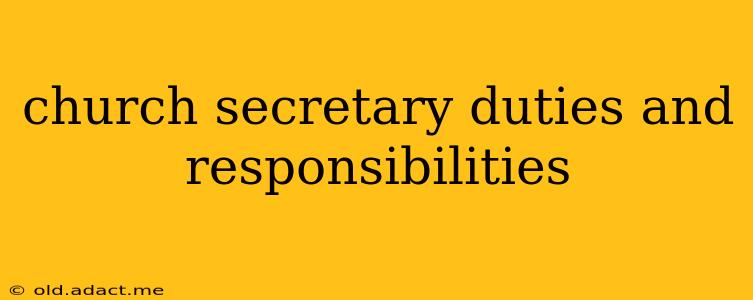The church secretary plays a vital role in the smooth operation of a church, acting as a central point of contact and managing various administrative tasks. This role requires a blend of organizational skills, communication prowess, and a deep understanding of church operations. This guide will delve into the multifaceted duties and responsibilities of a church secretary, answering many frequently asked questions.
What are the daily tasks of a church secretary?
Daily tasks often involve managing correspondence, answering phones, scheduling appointments, and maintaining church records. This includes everything from greeting visitors and answering their inquiries to preparing meeting agendas and minutes. The specific tasks will vary depending on the size and structure of the church. Some days may be more heavily focused on administrative tasks, while others may involve more direct interaction with church members. Flexibility and adaptability are key qualities for a successful church secretary.
What are the typical duties of a church secretary?
Typical duties encompass a wide range of responsibilities, extending beyond daily tasks. These can include:
- Maintaining Church Records: This is a crucial aspect, encompassing membership records, financial records (depending on the level of responsibility), event attendance, and other vital documents. Accuracy and confidentiality are paramount in this role.
- Managing Correspondence: This involves handling incoming and outgoing mail, emails, and other forms of communication, ensuring timely responses and appropriate distribution.
- Scheduling and Calendar Management: This includes coordinating appointments for the pastor, staff, and other church leaders, as well as managing the church calendar for events, meetings, and services.
- Preparing Reports and Documents: Generating reports on various aspects of church activity, preparing presentations, and creating other essential documents are common tasks.
- Assisting with Church Events: Often, the church secretary provides significant support during events, assisting with registration, logistics, and other essential aspects.
- Managing Church Software and Technology: Increasingly, church secretaries are responsible for managing church databases, websites, or other technology systems.
- Budgeting and Finance (in some cases): In smaller churches, the secretary may have additional responsibilities related to budgeting and financial record-keeping. However, in larger churches, this is typically handled by a dedicated finance team.
- Maintaining the Church Office: This encompasses the overall upkeep and organization of the church office, ensuring a welcoming and efficient workspace.
What skills are needed to be a church secretary?
Beyond the specific tasks, certain essential skills are crucial for success in this role:
- Strong Organizational Skills: Managing numerous tasks simultaneously and maintaining meticulous records are paramount.
- Excellent Communication Skills: Interacting effectively with diverse individuals, both in person and over the phone, is essential.
- Proficiency in Computer Software: Word processing, spreadsheets, and database management skills are critical. Familiarity with church management software is a significant advantage.
- Confidentiality and Discretion: Handling sensitive information with utmost confidentiality is essential.
- Problem-Solving Skills: Effectively resolving issues and finding solutions to challenges is crucial.
- Teamwork and Collaboration: Working effectively with other church staff and volunteers is essential.
- Spiritual Maturity: Understanding and aligning with the church's values and mission is important for fostering a positive and supportive environment.
What is the difference between a church secretary and a church administrator?
The key difference lies in the scope of responsibility. A church secretary typically focuses on administrative tasks, while a church administrator often oversees a wider range of operations, including personnel management, budgeting, and strategic planning. The church secretary often reports to the church administrator or pastor.
How much does a church secretary make?
Compensation varies widely depending on location, church size, experience, and the specific duties involved. It's advisable to research salary ranges in your local area for a more accurate estimate.
What education is required to be a church secretary?
While formal education isn't always strictly required, a high school diploma or equivalent is generally expected. Experience in office administration and proficiency in relevant software are often more important than specific degrees.
By understanding these duties, skills, and the overall context of the role, prospective candidates can better prepare themselves for a fulfilling career as a church secretary. This position is not merely clerical; it's a vital part of the church's ministry and outreach.
